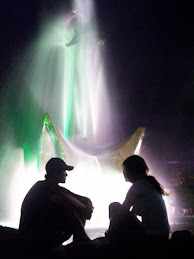
Colombia is moving closer to breaking the FARC—unless Venezuela stops it.
ON FEW, if any, other occasions has a head of state issued detailed orders for military mobilisation as jauntily as if he were ordering pizza, and on live television. That is what Hugo Chávez, Venezuela's president, did on March 2nd, after Colombian forces bombed a camp just inside Ecuador, killing Raúl Reyes, a senior commander of the Revolutionary Armed Forces of Colombia (FARC) guerrillas.
“Minister of defence!” bellowed Mr Chávez, on “Aló Presidente” (“Hello President”), his weekly radio and television programme. “Send me ten battalions to the border, including tanks.” He also ordered the forward deployment of his new Russian fighter-bombers, threatening that if Colombia's president, Álvaro Uribe, tried a similar raid on Venezuelan soil he would “send over the Sukhois”. The next day he broke diplomatic ties with Colombia.
Venezuelan troops (pictured above) and tanks duly moved to the more populated points of the long border between the two countries. Customs officials halted Colombian trucks at the busiest crossing point, between Cúcuta and San Cristóbal.
What made this performance odd was that it was Ecuador, not Venezuela, whose sovereignty had been violated. True, Colombia has often accused Venezuela of harbouring guerrilla leaders and tolerating camps near the border similar to the one bombed in Ecuador. But did Venezuela's president have a guilty conscience?
“Maybe he knew what was coming,” wrote Teodoro Petkoff, a guerrilla leader in the 1960s who now edits an opposition newspaper in Caracas. Mr Chávez's apparent over-reaction was a pre-emptive attempt to “throw a veil over the revelations he suspected might come from Raúl Reyes' computer,” suggested Mr Petkoff.
With Ecuador's president, Rafael Correa, following Mr Chávez's lead, this week's events sent Latin America's diplomats scurrying to prevent war enveloping the neighbourhood. But they also laid bare that Colombia's government is coming close to breaking the back of the FARC, and in the process threatening to shine light on its murky relations with neighbouring governments.
When Mr Uribe took office in 2002, the guerrillas were rampant. His predecessor had just halted peace negotiations because the FARC had used a “demilitarised” zone created to host the talks as a base for recruitment and for kidnapping (many of the politicians it has held hostage were seized during the talks). The guerrillas had some 17,000 troops; they blocked main roads and bombarded small towns, kidnapping and killing almost at will. To make matters worse, the state's inability to provide security had spawned murderous right-wing paramilitary groups.
Mr Uribe's “democratic security” policy has achieved a dramatic change. By expanding the security forces, he has driven the FARC from populated areas, while persuading most of the paramilitaries to demobilise. Officials reckon they have reduced the FARC's ranks to fewer than 11,000. But the guerrillas withdrew to the vast tropical lowlands, to areas they have controlled for 40 years. There they resisted a two-year offensive by 18,000 troops. The army could not get near the FARC's seven-man governing secretariat, of which Mr Reyes (the nom de guerre of Luis Edgar Devia) was a member.
 El embajador de Colombia en Venezuela, Fernando Marín, regresará a Caracas este martes tras la normalización de las relaciones entre los dos países alcanzada el viernes pasado en la Cumbre de Río, informó el funcionario este lunes.
El embajador de Colombia en Venezuela, Fernando Marín, regresará a Caracas este martes tras la normalización de las relaciones entre los dos países alcanzada el viernes pasado en la Cumbre de Río, informó el funcionario este lunes.
 El día de ayer, este diario publicó una fotografía, extraída del computador de 'Raúl Reyes', suministrada por una fuente de la Policía, cuyo pie de foto decía: "En la foto encontrada en el computador de 'Raúl Reyes', el ministro de Seguridad del Ecuador, Gustavo Larrea, dialoga con el guerrillero". El texto de la información respaldaba esta versión. Copias de la foto se repartieron en la cumbre de cancilleres de la OEA, donde generaron un encendido debate.
El día de ayer, este diario publicó una fotografía, extraída del computador de 'Raúl Reyes', suministrada por una fuente de la Policía, cuyo pie de foto decía: "En la foto encontrada en el computador de 'Raúl Reyes', el ministro de Seguridad del Ecuador, Gustavo Larrea, dialoga con el guerrillero". El texto de la información respaldaba esta versión. Copias de la foto se repartieron en la cumbre de cancilleres de la OEA, donde generaron un encendido debate. Venezuela says it will immediately normalise diplomatic relations with Colombia, a week after ties were cut.
Venezuela says it will immediately normalise diplomatic relations with Colombia, a week after ties were cut.





